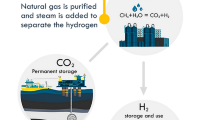Abstract
Replacing fossil fuels and natural gas with alternative fuels like hydrogen is an important step toward the goal of reaching a carbon neutral economy. As an important intermediate step toward utilizing pure hydrogen, blending hydrogen in an existing natural gas network is a potential choice for reducing carbon emissions. A computational fluid dynamic model is developed to quantify frictional losses and energy efficiency of transport of methane-hydrogen blends across straight pipe sections. It is observed that, in general, an increase in the energy costs is expected when hydrogen, with its lower density, is transported along with methane (which has higher density) in various blend ratios. However, the amount of increase in energy costs depends on the volume fraction of hydrogen and the nature of the flow conditions. The lowest energy costs are projected for transporting pure hydrogen under the conditions where the inlet velocity flow rates are similar to that used for transporting pure methane while the highest energy costs are expected when hydrogen is transported at the same mass flow rate as methane.
Graphical abstract



Similar content being viewed by others
Data availability
The datasets generated and/or analyzed during the current study are available from the corresponding author on reasonable request.
References
T. Isaac, HyDeploy: the UK’s first hydrogen blending deployment project. Clean Energy 3(2), 114–125 (2019)
GRHYD (2020). https://www.engie.com/en/businesses/gas/hydrogen/power-to-gas/the-grhyd-demonstration-project. Accessed 30 Dec 2021
THyGA (2021). https://thyga-project.eu/about-thyga/. Accessed 30 Dec 2021
L. Blanchard, L. Briottet, Non-combustion related impact of hydrogen admixture—material compatibility. (THyGA Project, 2020). https://thyga-project.eu/deliverable-d2-4-non-combustion-related-impact-of-hydrogen-admixture-material-compatibility/. Accessed 30 Dec 2021
NREL (2020). https://www.nrel.gov/news/program/2020/hyblend-project-to-accelerate-potential-for-blending-hydrogen-in-natural-gas-pipelines.html. Accessed 30 Dec 2021
PR Newswire (2020). https://www.prnewswire.com/news-releases/socalgas-and-sdge-announce-groundbreaking-hydrogen-blending-demonstration-program-to-help-reduce-carbon-emissions-301178982.html. Accessed 30 Dec 2021
M. Cadorin, M. Morini, M. Pinelli, Numerical analyses of high Reynolds number flow of high pressure fuel gas through rough pipes. Int. J. Hydrog. Energy 35, 7568–7579 (2010)
H. Schlichting, Experimental investigation of the problem of surface roughness. Ingenieur-Archiv 7(1), 42 (1937)
Y. Kobayashi, A. Kurokawa, M. Hirata, Viscosity measurement of hydrogen-methane mixed gas for future energy systems. J. Therm. Sci. Technol. 2(2), 236–244 (2007)
M. Flekiewicz, G. Kubica, An influence of methane/hydrogen proportion in fuel blend on efficiency of conversion energy in SI engine. J. Kones Powertrain Transp. 19(3), 117–124 (2012)
Acknowledgments
This study was supported in part by the NSF Grant DMREF 2119337 and the NYSERDA Grant 148947.
Author information
Authors and Affiliations
Corresponding author
Ethics declarations
Conflict of interest
The authors have no conflicts of interest to declare that are relevant to the content of this article.
Additional information
T. A. Venkatesh was an editor of this journal during the review and decision stage. For the MRS Advances policy on review and publication of manuscripts authored by editors, please refer to mrs.org/editor-manuscripts.
Rights and permissions
About this article
Cite this article
Tan, K., Mahajan, D. & Venkatesh, T.A. Computational fluid dynamic modeling of methane-hydrogen mixture transportation in pipelines: estimating energy costs. MRS Advances 7, 388–393 (2022). https://doi.org/10.1557/s43580-022-00243-0
Received:
Accepted:
Published:
Issue Date:
DOI: https://doi.org/10.1557/s43580-022-00243-0



